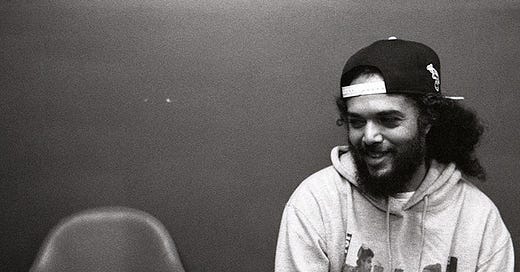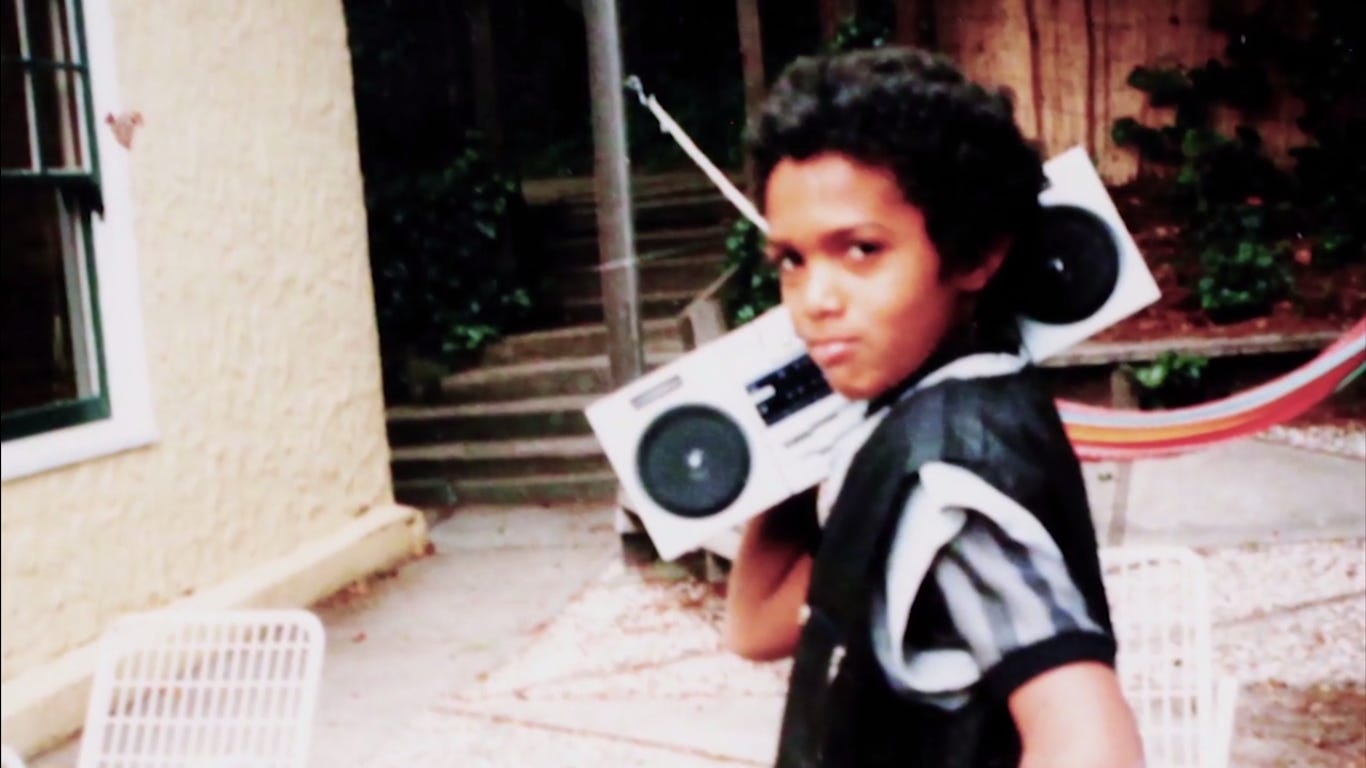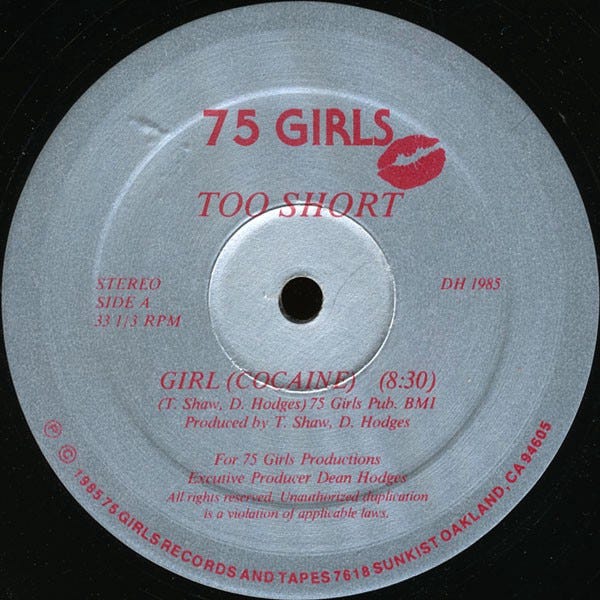In Conversation with Opio Lindsey from The Souls of Mischief (Field Bulletin USA Travel Club)
Q: What are your earliest memories of the Oakland hip-hop scene?
A: I’m born in the seventies. So when I was really small, hip-hop was really not the most popular music or culture in Oakland. You know what I’m saying. I just remember it kinda like exploding onto the scene and it basically coincided with my growth and development as a human being.
When I was a really small child, hip-hop wasn’t nothing. And when I started to come into my own self realization or whatever the word is, that’s when hip-hop made this amazing splash on the scene and it just changed everything.
All of the older kids that were in my neighborhood, they were all breakdancing, not so much rapping, but it was just the culture of hip-hop. People were breakdancing, there was a lot of graffiti. And just this amazing energy where people were super interested in this new phenomenon.
Q: What part of Oakland are you from?
A: When I was younger, I was living near Lake Merritt. And then I moved to East Oakland when I was around ten years old. Lake Merritt is the central part of Oakland. It used to be a hang out area. You know what I’m saying. Like on the weekends, people would roller skate around Lake Merritt. It was like a different culture, it wasn’t hip-hop. Oakland was a black city. There were these roller skating crews that would basically roller skate around Lake Merritt and people would drive cars. Even just the tone of the music, there was a high treble kinda thing. People were listening to like, not like P-funk, but funk music from the super late 70s. Like whatever was out in ‘79.
When I moved to East Oakland, right around the same time as when crack hit. It was a culture shift on a lot of different levels. Hip-hop was already popular and it was doing its thing. But there were a lot of young kids that had money too.
When I was living in East Oakland, my father lived in one area of East Oakland and my mother lived in another area. My Dad was in the 20s and my Mom was near the 80s. On 82nd in East Oakland is where my Mom was at and my Dad was on East 28th Street. They’re not that far from each other, but they’re totally different areas.
Q: I read that your father was a musician. What did he play?
A: My Dad went to school for music and taught music and he was a musician. The instrument that was his focus, was the flute. So he played the flute. My Dad was working with kids. So he had several different stops on his path. First he was working with special education kids. He was doing substitute teaching and he was a music teacher at different schools in the Oakland Public School District, so he kinda bounced around to different schools.
I think it was at Havenscourt, I remember him talking about how he met these kids. He was like, ‘Man these guys can play. They’re talented.’ He was talking about Tony! Toni! Tone! And then he started working at juvenile hall in Oakland.
Q: I saw a YouTube video with you and Aceyalone at a Chinese restaurant, where you mentioned that Tajai and A-Plus were on early demo projects with Sir Jinx. Also, in Shomari Smith’s documentary Til Infinity, you explained that Hiero was on your radar before you linked up with them. When did you become aware of the Hiero cats?
A: Me and Casual went to junior high together [Montera]. So we met in junior high. We all lived in the same neighborhood. I lived in the same neighborhood as Tajai, Casual, Del, A-Plus, Phesto. They all like lived close to me. You know what I’m saying. I had a separate group of friends so I really didn’t know them. You know what I’m saying. Casual went to elementary school with Del, Tajai and A-Plus.
Q: Do you know what elementary school that was?
A: They went to different ones. One was Grass Valley and another one was Howard I believe.
A: From my relationship with Casual. We clicked up in junior high, because we both had a passion for hip-hop. You know what I’m saying. Before I met Casual, I had friends who were into hip-hop, but they were just kinda casual fans. Anytime I tried to talk to someone about nuances or why I thought this was dope, they kinda got it, but not really. They just didn’t give a fuck about it as much. They were into other shit. And for me it was like a driving force. When I met Casual we had kindred spirits. We were super, super passionate about hip-hop.
Through my relationship with Casual, he was putting me up on what Del, Tajai and A-Plus were doing. I’m pretty sure he had some like demos. It sounded super professional.
Basically what I was doing, I had like the little dual cassette tapes you could plug your headphones into the mic socket and then you could rap into the headphones. You could rap into your headphones. Then you could play the instrumental beat on one tape and then dub, record yourself rapping and dubbing the tape onto the other tape in the dual cassette tape.
So that was all I was doing. That’s how I was recording songs basically. But they was going to the studio and making original beats and doing all types of shit. That shit was inspirational before I even really knew them.
I would see A-Plus drive by the house, cause I’d be kicking it at Casual’s house and Casual and A-Plus lived right next to each other. So I would see him drive by with his Dad. Or see Tajai, we would catch the bus and walk the same route but we really didn’t know each other.
Me and Casual saved up our money and went to the studio in like 8th grade. Rented the spot and did the whole thing. That’s when it kicked into a whole other level. Tajai and A-Plus and Del was already doing their thing. They were going back and forth to L.A. and recording with Sir Jinx. Just really doing it on a much higher level than obviously what I was doing at home with my little cassette tapes.
That shit was inspirational to me. You know what I mean. Like these dudes are making real songs. You know what I mean. It inspired me and Casual to get into the studio. From there it was almost like a natural evolution, because we were all in the same neighborhood.
At the time, people fucked with hip-hop and they liked it. But it wasn’t like everyone was trying to do it. It wasn’t like a lot of people were trying to rap or make beats. If anything, more people danced. That was like the main thing. People were dancing.
Q: At that time, were there a lot of breakdancing crews and roller skating crews in Oakland?
A: As far as the roller skating thing, their outfits would all be similar and then they would have the old english writing that said whatever crew or little Playboy bunnies and shit. Majority it was all male, but then maybe you’d see an all female group. These people had on all orange. These people had on black. Those people had on all blue. As far as I could see, I mean I was a very small child, it was people having fun. It was like a party atmosphere type thing.
They had old english lettering on their whatever outfits that signified who they were. It would have whatever someone nickname was, plus the crew name and accoutrement whatever else was on there [chuckles].
Q: What was your first memory of Too Short?
A: Too Short’s been around for a long time. It was him and another rapper named Freddy B who were super popular when I was a kid. But it was like real underground. You couldn’t really go to a store and buy a tape necessarily. It was like one of my close friends had an older brother, so like he would always lace his younger brother with all the fly shit. You know what I’m saying. Too Short tapes, Freddy B tapes.
I feel like I was in the 2nd grade listening to this shit. We were supposed to be listening to these reading tapes [chuckles]. You listen to a reading tape and read along with it. And we was listening to Too Short.
He was just like a part of the culture of growing up in Oakland. I think one of his most popular songs was ‘Girl that’s your life’ [Girl (Cocaine) on 75 Girls].
It's an anti-drug song. I think it’s called ‘Girl Don’t Do It’ or something. He was already out and doing his thing and had all these songs and shit that people knew about. But I feel like that song was the one that started to come out of the underground tapes, not really mainstream, but more people knowing about it. You’d hear it on college radio and stuff like that.
For me, my favorite Too Short was when he came out with ‘Freaky Tales’ that was the A-side and the B-side was ‘Dope Fiend Beat’. And they were both equally massive. You know what I’m saying. Those two songs to me, that’s like my favorite Too Short stuff. You know what I’m saying. He has a catalog of amazing music. You know what I’m saying.
I saw him perform, he opened up for a Run-DMC concert. He was one of the first people, if not the first person to go on. He did ‘Freaky Tales’, which was a huge song in Oakland. I knew all the words, word for word. You know what I’m saying. And then he did ‘Dope Fiend Beat’, which was another massive song that everybody knew all the lyrics to. And he was in the middle of doing his music and the lights turned on and shit. I was like damn what the fuck happened? I guess, looking back, somebody was probably like this dude is killing it way too hard right now, we need to fucking end this thing. You know what I’m saying. So they cut the music and turned the lights on and shit. It wasn’t like people started rioting it was more like damn what the fuck just happened? They hated on him because he was rocking so hard.
Q: Was that at the Coliseum?
A: It was probably the Oakland Coliseum. There basically two venues that did all the hip-hop shows. In my memory it was at the Coliseum, but it could have been at the Henry J. Kaiser Convention Center. Those were like the two places that they did hip-hop shows. I would go to both of those. They would have all the big concerts with a super stacked lineup. It was never just Run-DMC. It was Run-DMC, fucking Whodini, LL Cool J, Fat Boys. Everybody would be performing. You know what I’m saying.
Q: In that cassette tape era, would you see the hand-to-hand distribution of music, whether at school or on the bus?
A: Nah, because we were younger. You know what I’m saying. So that was for people who had a car basically. You know what I mean. That’s who was really buying those tapes. So you were getting a dub or some shit, a copy of the tape or whatever. The people who had the real shit were older than us. They were driving [chuckles].
I never saw Too Short on the bus or got a hand-to-hand cassette or nothing like that. I’m pretty sure that at time he wasn’t even riding the bus. These guys were like legends. Everybody was already really supporting them, when I got up on it.
Like my boy’s older brother was a serious D-Boy [dope boy] in West Oakland. He had all the flashy cars. All the fucking money. All that shit. You know what I’m saying. He just was fully immersed in the culture. He was getting the tapes firsthand, either from one of his homies or directly from Short. Short used to go to all them different turfs or whatever and sell tapes. That’s how they expanded.
Q: Can you speak on the Black Panthers influence in Oakland?
A: There were always people around that were Black Panthers. It wasn’t like they were just a thing of the past. You know what I’m saying. They were still there. If you really look at how the Black Panthers were in Oakland, it’s romanticized now, but these were very kind normal, just your average kinda person. You know what I’m saying. It gets romanticized and blown out of proportion because people think they were touched by the hand of God or whatever, but they stepped to what they believed in. They were basically your average Oakland youth. You know what I’m saying. They were fed up with the injustice.
There’s always, even to this day, been a level of black consciousness that I was around when I was a kid. It was heavy in Oakland. I lived in Oakland, so I experienced it more there, but it was also happening in San Francisco and Berkeley.
Q: Do you remember when crack hit Oakland?
A: I didn’t have any family members who were dealing drugs or nothing like that. You know what I’m saying. I did see a culture shift. It was, like I said, people rollerskating and shit, then you had crack hit and it was a lot of younger kids that were very close to my age. You know what I mean. It just kinda took over the city. You know what I’m saying. Obviously there’s a lot of bad shit happening, but from the outside looking in, you see flashy cars and jewelry and people just having hella shit. You know what I’m saying. And young. Say I’m in the 8th Grade, I’m fourteen, there’s people younger than me that have a car and got money and shit. At thirteen, twelve. These dudes had jewelry and clothes. It was just wild. Thinking about it now, it seem even crazier. I do remember there being a transition because in Oakland the drug of choice was probably heroin. There was an older generation that had a different set of rules and regulations or whatever. There was a big drug dealer in Oakland named Felix Mitchell. He went to prison, he died, that shit was like on the news. You know what I’m saying. He had like a procession with Rolls Royces and horse drawn carriage and that type of stuff. And that was the generation before crack hit, that was their era. You know what I’m saying. That’s like a cultural shift, of him representing the older generation and then it was like a lot of younger kids doing stuff.
Q: What were your fondest memories from the Midnight Marauder tour with De La and Tribe?
A: The tour itself was like a dream come true. It’s hard to narrow it down. We were in high school a year before. You know what I’m saying. Looking at them on television, listen to their records. Obviously they had such an impact on our lives in general, not just musically, but culturally. You know what I’m saying. Just their whole vibe was something that I really loved. You know what I mean. The whole Native Tongue movement. To have the opportunity to go on tour with them was almost inconceivable. You know what I mean. It took awhile for us to relax or even feel like we belong. We looked up to these guys. They taught us a lot on tour. About how to handle yourself on the road, just stuff about the music business. It was a life changing experience for us. We hadn’t really traveled around, so to go to cities like Chicago or Washington D.C. to see damn people know our music and their appreciative of what we’re doing. There were a lot of people who were really down with Souls of Mischief, who really wanted to see us, supported us and connected with our music on a deeper level. It was a beautiful experience. Everyone on tour, even road managers, looked out for us. Because we were kids, we weren’t even twenty one.
Q: Did you all attend the same school?
A: When we first started Souls, everybody went to different schools. A-Plus went to Castlemont. I went to Skyline, the same high school as Casual and Del. So me, Del and Casual were in high school together. Tajai went to Bishop O’Dowd [Brian Shaw also went to Bishop O’Dowd] and Phesto went to Saint Mary’s. We didn’t all go to the same school. Our senior year, A-Plus went to Skyline, Pep Love went to Skyline. Del had graduated. You know what I’m saying.
Q: How would you describe Souls of Mischief’s style from that era?
A: We were like kinda not like the mainstream style in Oakland. You know what I mean. Having dreads and all that was kinda an anomaly at the time. Because we liked hip-hop, we liked music from all over. Geto Boys, East Coast stuff, if it was dope we liked it. All of those styles were influential to us. The message we were getting from all the rappers was: be original. Don’t sound like anybody, have your own style. That was our focus, to be original. The more popular style of music was gangsta rap, that’s what Oakland was really fucking with.
[Almost finished 40:30]







